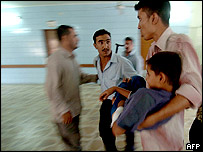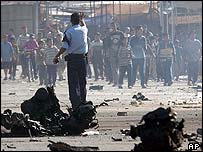
Crowds had gathered for a ceremonial ribbon-cutting
|
A series of bomb blasts in the Iraqi capital, Baghdad, has killed at least 41 people, among them 34 children.
The bombs were detonated as crowds were gathering to celebrate the opening of a water treatment plant and US soldiers were handing out sweets.
At least 131 people were injured and there were harrowing scenes as parents searched for their children.
The attacks were later apparently claimed by the group led by Abu Musab al-Zarqawi, who is linked to al-Qaeda.
A statement hailing "heroic operations" was posted on a website used by Islamic militants in the name of his Tawhid and Jihad group.
They have been behind a string of attacks and abductions of foreigners, including Briton Ken Bigley.
The message said Zarqawi supporters had attacked "a convoy of invading forces", though it remained unclear whether it referred to the blasts at the water plant - an attack that caused the most number of children to die in one incident since the war.
The statement - which could not be verified as coming from Zarqawi - also claimed a car bombing earlier on Thursday that killed two Iraqi policemen and a US soldier in the Abu Ghraib district of Baghdad.
There were many other casualties on a day of bloodshed across Iraq, including:
- A US soldier killed by a rocket fired at a US base near Baghdad
- A senior policeman shot dead in the northern city of Mosul
- Also in the north, the Kirkuk mayor's chief bodyguard shot dead
- Four people killed in a car bombing in Talafar that also injured about 16 others
- At least four children among six or seven people killed in Falluja after US forces allegedly fired on their car
- At least three civilians killed in a US air strike on Falluja overnight.
'A car exploded'
Baghdad hospitals struggled to cope with the influx of casualties from the bombings in the poor south-west al-Ummal district.
Many of the injured - who included 10 US soldiers - suffered shrapnel wounds in the blasts which began at about 1300 (0900 GMT), correspondents said.
Pools of blood formed on the hospital floors, while at the scene of the blasts people picked through wreckage to recover body parts.
Children who survived the attack described how they had been rushing towards the US convoy to collect sweets from the troops.
"The Americans called us, they told us come here, come here, asking us if we wanted sweets," 12-year-old Abdel Rahman Dawoud told the Associated Press news agency from his hospital bed where he lay naked, with shrapnel embedded all over his body.
"We went beside them, then a car exploded."

Many victims were caught trying to help those hit in the first blast
|
Officials say the first blast was soon followed by another car bomb and then the explosion of a device on the road. It remains unclear whether the US convoy or the crowds were the prime target.
The BBC's Caroline Hawley in Baghdad says the sequence of explosions was a highly co-ordinated attack to prevent the reconstruction of Iraq, as well as spreading fear.
'Good crack at success'
Violence continued in the restive city of Falluja, where doctors said a woman and a child were among at least three people killed when US forces launched air strikes on a house.
The military said it targeted supporters of Zarqawi.
US Defence Secretary Donald Rumsfeld acknowledged that insurgents and kidnappers were having some success in making people believe that Iraq was not ready for democracy.
But in an interview with West Virginia radio station WCHS he said that there was information that Iraqis, including those in the Shia population, were "getting fed up with Zarqawi and his terrorist crowd killing their friends and neighbours and relatives".
"I am personally convinced that we've got a very good crack - the Iraqis have a very good crack - at being successful in this important and noble effort," he added.
Iraq's interim Deputy Prime Minister Barham Saleh said the government was determined to retake rebel cities like Falluja within weeks and to hold elections as planned early next year.
"We aim to regain control of these areas before the month of November," he told reporters, expanding on earlier remarks by interim Prime Minister Iyad Allawi that "decisive action" was being planned for Falluja.